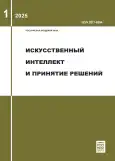Decomposition Method of Functional Characteristics of Artificial Intelligence Systems
- Autores: Garbuk S.V.1,2
-
Afiliações:
- All-Russian Institute of Scientific and Technical Information RAS
- Technical Committee for Standardization No. 164 “Artificial Intelligence” Federal Agency on Technical Regulating and Metrology
- Edição: Nº 1 (2025)
- Páginas: 14-32
- Seção: AI-enabled Systems
- URL: https://journal-vniispk.ru/2071-8594/article/view/293487
- DOI: https://doi.org/10.14357/20718594250102
- EDN: https://elibrary.ru/WVSNNW
- ID: 293487
Citar
Texto integral
Resumo
In making decisions on the possibility of using artificial intelligence systems to solve specific applications, one of the critical problems is an objective assessment of the functional characteristics for these systems in the planned operating conditions. The article proposes a universal approach to justifying the composition of environmental factors, the variability of which should be taken into account to ensure the required level of representativeness of the conducted tests of artificial intelligence systems. The proposed approach is based on the assumption that it is necessary to develop a classifier of elementary intellectual functions similar to the functional structure of human intelligence and having certain, unified within one class, requirements to the variability of their testing conditions.
Sobre autores
Sergey Garbuk
All-Russian Institute of Scientific and Technical Information RAS; Technical Committee for Standardization No. 164 “Artificial Intelligence” Federal Agency on Technical Regulating and Metrology
Autor responsável pela correspondência
Email: garbuk@list.ru
Candidate of technical sciences, senior scientific researcher, Director, Chairman
Rússia, Moscow; MoscowBibliografia
- Minsky M. Steps Toward Artificial Intelligence // Proceedings of the IRE. 1961. V. 49 (1). P. 8-30.
- GOST 59277-2020. Sistemy iskusstvennogo intellekta. Klassifikaciya sistem iskusstvennogo intellekta Data vvedeniya 01.03.2021 [Artificial intelligence systems. Classification of artificial intelligence systems. Introduction date 01.03.2021].
- PNST 838-2023. Iskusstvennyy intellekt. Struktura opisaniya sistem iskusstvennogo intellekta, ispolzuyuschih mashinnoe obuchenie (ISO/IEC 23053:2022, IDT) [Artificial Intelligence. Description structure of artificial intelligence systems using machine learning (ISO/IEC 23053:2022, IDT). Introduction date 01.01.2024].
- ISO/IEC 24030:2024. Information technology — Artificial intelligence (AI) — Use cases. Introduction date 08.04.2024. P. 184.
- Chen F., Zhou J. Humanity Driven AI: Productivity, Wellbeing, Sustainability and Partnership. Sydney: Springer Cham, 2021. P. 330.
- Nacionalnaya strategiya razvitiya iskusstvennogo intellekta na period do 2030 goda, utverzhdena Ukazom Prezidenta Rossiyskoy Federacii ot 10.10.2019 g. No 490 [The 2030 National strategy for the development of artificial intelligence, approved by the Decree of the Russian Federation President No 490 dated 10.10.2019].
- Schmid T., Hildesheim W., Holoyad T., Schumacher K. The AI Methods, Capabilities and Criticality Grid. A ThreeDimensional Classification Scheme for Artificial Intelligence Applications // KI Künstliche Intelligenz. 2021. V. 35. P. 425–440.
- Garbuk S.V. Ocenka kachestva sistem iskusstvennogo intellekta: osobennosti provedeniya i normativno-tehnicheskaya baza [Assessing the quality of AI systems: implementation features and regulatory framework] // Kontrol kachestva produkcii [Production Quality Control], 2024. No 1. P. 20-26.
- Cosmides L., Tooby J. Beyond intuition and instinct blindness: toward an evolutionarily rigorous cognitive science // Cognition. 1994. V. 50. P. 41-77.
- Dreyfus H. What Computers Can't Do: The Limits of Artificial Intelligence. HarperCollins, 1978.
- Markov A. Evolyuciya cheloveka. V 2 kn. Kn. 1. Obezyany, kosti i geny [Human Evolution. In 2 books. Book 1: Monkeys, Bones and Genes]. Moscow: AST: CORPUS, 2014. P. 464.
- Markov A. Evolyuciya cheloveka. V 2 kn. Kn. 2. Obezyany, neyrony, dusha [Human Evolution. In 2 books. Book 2: Monkeys, Neurons, Soul]. Moscow: AST: CORPUS, 2014. P. 511.
- Oparin A.I. Zhizn, ee priroda, proishozhdenie i razvitie [Life, its nature, origin and development]. Мoscow: Izdatelstvo Akademii nauk SSSR [Publishing house of the USSR Academy of Sciences], 1960. P. 190.
- Tihomirov O.K. Psihologiya myshleniya [Psychology of thinking]. Мoscow: Izdatelstvo Moskovskogo universiteta [Moscow University Press], 1984. P. 272.
- Jung C.G., Fon Franz M.-L., Henderson J.L., Jacobi J., Jaffe Man and his Symbols. Doubleday, 1964.
- RMG 29-2013 GSI. Metrologia. Osnovnye terminy i opredelenia. Rekomendacii po mejgosudarstvennoi standartizacii ot 05.12.2013 [Metrology. Basic terms and definitions. Recommendations on intergovernmental standardization from 05.12.2013] No 29-2013.
- Finn V.K. Intellekt, informacionnoe obschestvo, gumanitarnoe znanie i obrazovanie [Intelligence, Information Society, Humanities Knowledge and Education]. Predisl. V.A. Lektorskogo [Foreword by V.A. Lektorskii]. Мoscow: LENAND, 2021. P. 464.
- Nickerson R.S., Perkins D.N., Smith E.E. The teaching of thinking. Hillsdale, NY: Erlbaum, 1985.
- Dunin-Barkovskiy V.L. Bugorkovye attraktory i problema poiska «koda razuma» [Bump attractors and the problem of searching for the “code of the mind”. // Matematicheskaya biologiya i bioinformatika. III Mezhdunarodnaya konferenciya. Doklady. Pod red. V.D. Lahno [Mathematical Biology and Bioinformatics. III International Conference. Reports. Edited by V.D. Lakhno]. P. 66.
- Goldberg E. The executive brain: Frontal lobes and the civilized mind. Oxford University Press, USA, 2001.
- Shamis A.L. Puti modelirovaniya myshleniya [Artificial Minds: Paths and Prospects]. Мoscow: URSS, 2017.
- Knyazeva E. N. Enactivizm: kinceptualny povorot v epistemologii [Enactivism: a conceptual turn in epistemology]// Voprosy filosofii [Problems of Philosophy]. 2013. No 10. P. 91–104.
- Knyazeva E. N. Evolucionnaya epistemologia pered licom mejdisciplinarnych vyzovov sovremennoy nauki [Evolutionary epistemology in the face of interdisciplinary challenges of modern science] // Filosofia nauki. Vyp. 19. [Philosophy of Science. V. 19]. Мoscow: Institut Filosofii RAN [Philosophy Institute of the Russian Academy of Sciences], 2014. P. 125-144.
- Russell S.J., Norvig P. Artificial Intelligence. A Modern Approach. Second Edition. Pearson Education, Inc. 2003. 874 p.
- Kratkiy tolkovyy psihologo-psihiatricheskiy slovar. Pod red. K. Igisheva [Concise explanatory dictionary of psychology and psychiatry. Edited by K. Igishev]. 2008.
- Jalaian B., Lee M., Russell S. Uncertain Context: Uncertainty Quantification in Machine Learning // AI MAGAZINE. 2019. V. 40. No 4. P. 40-49.
- Adel T., Bilson S., Levene M., Thompson A. Trustworthy Artificial Intelligence in the Context of Metrology. 2024. arXiv:2406.10117v1 [cs.LG] 14.06. 2024.
- Arbib M. The metaphorical brain; an introduction to cybernetics as artificial intelligence and brain theory. New York, Wiley-Interscience, 1974.
- Garbuk S.V., Gubinskiy A.M. Iskusstvennyy intellekt v veduschih stranah mira: strategii razvitiya i voennoe primenenie [Artificial Intelligence in the World's Leading Countries: Development Strategies and Military Applications]. Мoscow: Znanie [Knowledge], 2020. P. 590.
- Sechenov I.M. Refleksy golovnogo mozga [Reflexes of the brain]. Мoscow: AST, 2015. 352 p.
Arquivos suplementares








